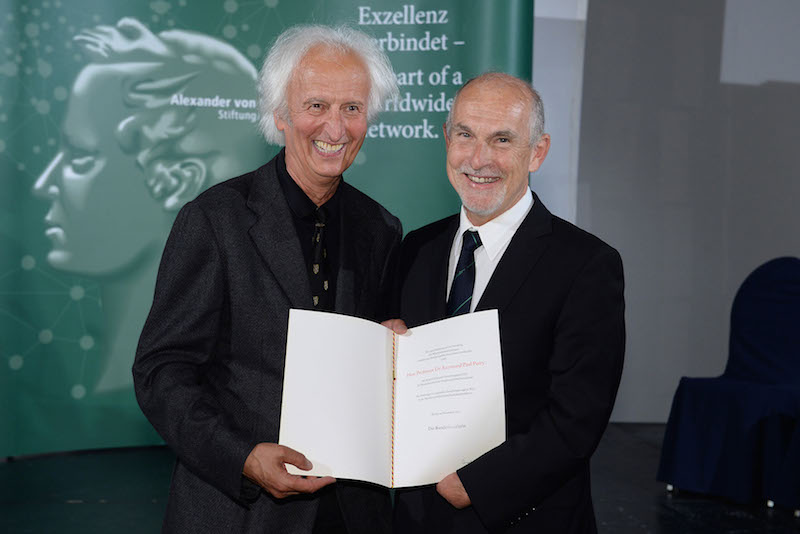
Dr. Helmut Schwarz presents Distinguished Professor Raymond Perry (right) with the Konrad Adenauer Research Award at Charlottenburg Palace in Berlin / Photo: David Ausserhofer, Humboldt Foundation
Psychology professor honoured in Germany
Raymond P. Perry, Distinguished Professor of psychology, was recently hosted by the Alexander von Humboldt Foundation and the Canadian Embassy as the recipient of the Konrad Adenauer Research Award. The Adenauer Award, co-sponsored by the Humboldt Foundation and the Royal Society of Canada, is awarded annually to a researcher whose accomplishments in the humanities or social sciences have earned international recognition.
The festivities involved a three-day visit to Berlin, Germany, that included lunch sponsored by the Canadian Embassy, dinner and award ceremonies at the Royal Palace of Charlottenburg and Bellevue Castle, and tours of historic Berlin. The festivities were preceded by an two-day ceremony in Ottawa in 2013 hosted by the Royal Society of Canada as the bilateral sponsor of the award.
About the award
The Konrad Adenauer Research Award, created to promote academic collaboration between Canada and the Federal Repulic of Germany, is available to be awarded annually to a Canadian scholar in the humanities or social sciences. The Award is presented to honour the scholar’s entire academic record. The recipient is invited to carry out a research project of his/her choice in Germany, in cooperation with German colleagues, for a period of up to one year.
About Dr. Perry’s research
In collaborations with colleagues, Dr. Perry studies goal attainment, emotional well-being, prejudice and discrimination, and physical health and mortality from a social cognition and perceived control perspective. The theme throughout his research is that explanatory thinking predicts an array of maladaptive outcomes including personal failure, the stigmatization of others, poor health, longer hospital stays, and earlier deaths. The dysfunctional mind-sets that lead to cognitive, emotional and motivational deficits in young adults also appear to contribute to the psychological and physical deterioration of older adults as well.
In response to these developments, Dr. Perry has also explored motivation-enhancing treatments, attributional retraining (AR), designed to modify dysfunctional explanatory thinking. AR assists individuals to overcome life’s challenges by replacing self-defeating cognitions with those that promote adaptive patterns of emotion, motivation, and behavior. People suffering the vicissitudes of old-age, for example, adjust more positively to onerous life circumstances following an AR treatment. In failure-prone young adults, AR produces positive changes in explanatory thinking and in emotional well-being, which in turn, intensifies goal striving. In practical terms, the merits of AR treatments are spotlighted in terms of the improvement of students’ GPAs for several years after treatment administration, and fewer students withdrawing from courses or from university entirely. (The Bulletin wrote this work in 2008.)
Whether focusing on young adults coping with failure in achievement settings, on the motivational dynamics of people who denigrate others for being different, or on older adults struggling with cognitive and physical deficits associated with aging, his research stresses the importance of dysfunctional mind-sets in adaptation. In so doing, his work delves into how people deal with life’s calamities in social, health, and achievement situations.
Research at the University of Manitoba is partially supported by funding from the Government of Canada Research Support Fund.






